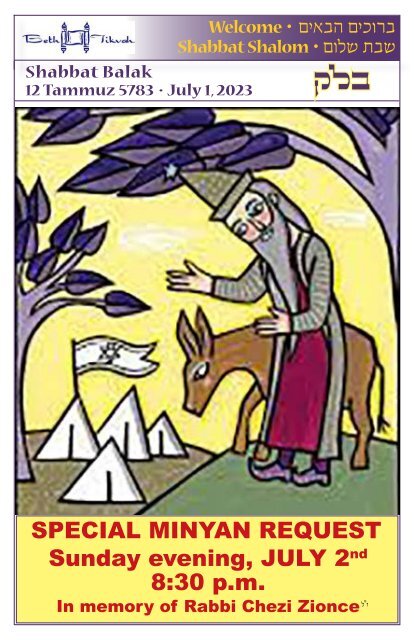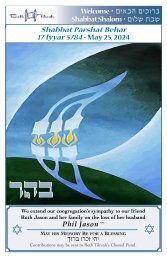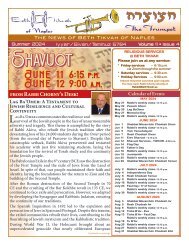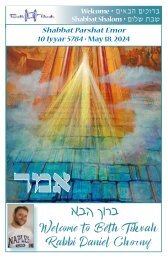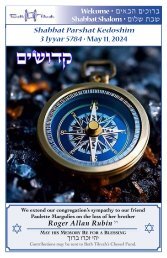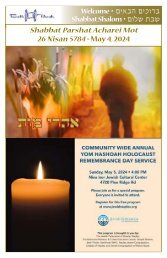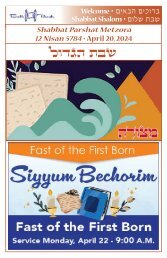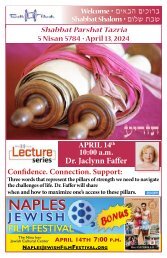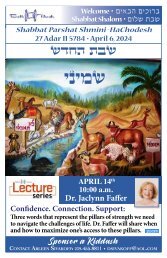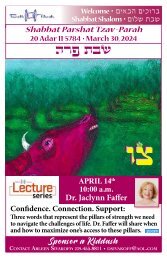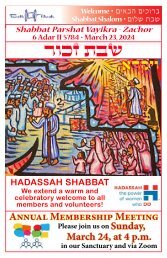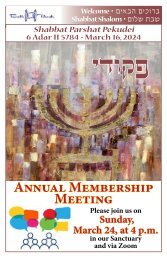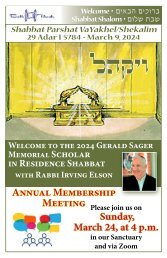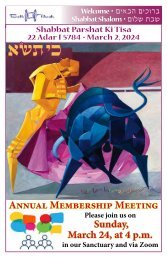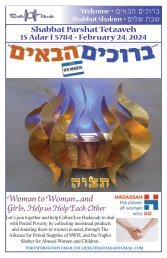Create successful ePaper yourself
Turn your PDF publications into a flip-book with our unique Google optimized e-Paper software.
Welcome • ohtcv ohfurc<br />
Shabbat Shalom • ouka ,ca<br />
Shabbat Balak<br />
12 Tammuz 5783 • July 1, 2023 ekc<br />
SPECIAL MINYAN REQUEST<br />
Sunday evening, JULY 2 nd<br />
8:30 p.m.<br />
In memory of Rabbi Chezi Zionce k ’’z
Yahrtzeiten<br />
120 sg<br />
vfrck oburfz<br />
June 30 • 11 Tammuz Bill Morgan – Father of Jay Kaye<br />
Albert Barber – Father of Martin Barber<br />
July 1 • 12 Tammuz Haskell Nemeroff – Father of Judith Adelman<br />
Bertha Hecht – Relative of Arnold Bresnick<br />
Solomon Wasserman – Father of Mark Wasserman<br />
Lois Levin – Wife of Samuel Levin<br />
July 2 • 13 Tammuz Morris Zoldan – Father of Jack Zoldan<br />
` Mason Kronick – Father of Carol Mest<br />
July 3 • 14 Tammuz Rabbi Chezi Zionce – Friend of Arleen Sivakoff<br />
Bernard Alpert – Husband of Fran Alpert<br />
July 5 • 16 Tammuz Helen Kramer – Mother of Nancy Garfinkel<br />
July 6 • 17 Tammuz Rebecca Fant – Mother of Ray Fant<br />
Birthdays<br />
June 30<br />
July 2<br />
July 3<br />
July 5<br />
July 6<br />
July 7<br />
jna `skuv ouh<br />
Sarah Castro<br />
Jay Kaye, Ammos Chorny, Lawrence Macks<br />
Michael Sobol<br />
Ilya Prizel<br />
Kathy Greenberg, Debra Antzis<br />
Ellaine Rosen<br />
Shabbat Kiddush Sponsored by:<br />
Arleen Sivakoff and<br />
Shelly & Bob Goodman<br />
In loving memory of Rabbi Chezi Zionce<br />
Linda & Shep Scheinberg<br />
In honor of Rabbi Chorny’s Birthday<br />
Mavens: Steve Chizzik<br />
Assisted by: Kathy Abrams, Linda & Shep Scheinberg,<br />
and Jill Valesky<br />
Sponsor a<br />
Kiddush<br />
Contact Arleen Sivakoff:<br />
dsivakoff@aol.com • 239.455.8811<br />
k’’z
Torah & Haftarah Readings:<br />
Shabbat Balak: Num. 22:2-22:38 (Etz Hayim p. 894)<br />
1. 22:2-4 2. 22:5-7 3. 22:8-12 4. 22:13-20<br />
5. 22:21-27 6. 22:28-30 7. 22:31-38 M. 25:7-9 (p.908)<br />
Haftarah: Micah 5:6-6:8 (Etz Hayim p. 915)<br />
Torah Commentary<br />
D’var Torah:<br />
The End of a Generation - Bex Stern-Rosenblatt<br />
Two weeks ago, in the story of the spies, we learned that the generation of Israelites<br />
who left Egypt would not survive to enter the land of Canaan. The epic journey<br />
they had made would result in freedom for their children and in death for them.<br />
As God reiterates a number of times, their “corpses will fall in the wilderness”<br />
rather than reaching the promised land.<br />
By the time we stand on the Plains of Moab to listen to Moses recite Deuteronomy,<br />
that first generation seems to have died off. After all, the listeners, the audience, in<br />
Deuteronomy seems to be the second generation, the generation who will enter<br />
the land. Moses tells us in Deuteronomy 2:14 that 38 years have passed, that “the<br />
whole generation, the men of war, came to an end from the midst of the camp as<br />
the LORD had sworn concerning them.”<br />
Accordingly, somewhere or some time in the Book of Numbers, there should be<br />
a record of the deaths of the first generation. We should learn that the moment<br />
has come when God’s word has been fulfilled, when the last of the corpses of the<br />
first generation has fallen and we, the next generation, are ready to enter the land.<br />
It seems like a moment that should be, if not celebrated, accompanied by a bit<br />
of fanfare. At the very least, it seems like it should be mentioned. But there is no<br />
such moment. The Torah makes no mention of the point at which that transition<br />
is completed.<br />
Some people point towards the two censuses in the Book of Numbers, the one<br />
that opens the book and the one that occurs in Numbers 26 after the Baal Peor<br />
incident. Different people are recorded in each. Therefore, the first generation<br />
must have died before the second census. But when? Did the incident of Baal<br />
Peor happen to the first or second generation? Likewise, did Balaam open his<br />
words of praise, “how beautiful are your tents, oh Jacob” about the first or<br />
second generation?<br />
The one verse, Deuteronomy 2:14, points us towards a place at which it happens,<br />
saying that the last of that generation died at “the time that we went from Kadesh-<br />
Barnea until we crossed the Wadi Zered.” That moment occurs in our parashah,<br />
in Numbers 21. This chapter is a long list of our wilderness wanderings and it is<br />
notoriously difficult to locate these places on a map. Nonetheless, the Wadi Zered<br />
of Deuteronomy 2:14 appears. We read in verse 12, “from there they journeyed<br />
onward and camped at Wadi Zered, and in verse 13, “from there they journeyed<br />
onward and camped across the Arnon.” Using the verse from Deuteronomy,
we would believe that between verses 12 and 13, the last of the generation<br />
that left Egypt perished. There is not so much of a hint towards this seemingly<br />
monumental moment in the text. The subject does not change, the journey goes<br />
on. There is no mention of a grand statement, no “as God had commanded<br />
concerning that generation for what they had done when…” The text merely<br />
continues.<br />
This may be intentional. There is never a concrete point when one generation<br />
ends and the next generation begins. The idea that the second generation was<br />
separate, different, from the first is blatantly false. Their actions mirror each<br />
other. The punishment of the first generation, their death in the wilderness,<br />
was no different from the mortality of all humans, our foretold ending since<br />
the Garden of Eden. We die. Rather, the blessing for the first generation is that<br />
their people continue. Their children and their descendants will enter the land.<br />
The promise that God made to their ancestors will be fulfilled for generations<br />
to come.<br />
The continuity of the Israelite people and the irrelevance of the passing of the<br />
generations is thrown into stark contrast with the other nations in Numbers 21.<br />
We read all that is left of the civilization of Moab in the Song of Heshbon, “Woe<br />
to you, Moab, You are lost, O people of Chemosh,” the remnant of an entire<br />
nation remain as just a footnote, an echo of an ancient song, recorded in our<br />
living text. We need not mention the moment of the passing of a generation of<br />
Israelites because there will never be a point at which we disappear, remaining<br />
only in song.<br />
Join Rabbi Chorny<br />
✺<br />
for his weekly discussion<br />
group, Tuesdays at<br />
12:15 p.m. via<br />
and IN Person<br />
Office Hours:<br />
Weekdays<br />
from 10:00 a.m. to 2:00 p.m<br />
Gillian can be reached at<br />
(239) 434-1818<br />
Rabbi’s Office Hours:<br />
Tuesdays and Thursdays<br />
from 10 a.m. to noon.<br />
Or call his cell (239) 537-5257<br />
to make an appointment.<br />
Beth Tikvah of Naples<br />
1459 Pine Ridge Road<br />
Naples, FL 34109<br />
239 434-1818<br />
Visit us online at<br />
bethtikvahnaples.org<br />
or scan the QR code<br />
to go there directly


